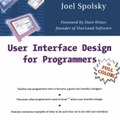 Hogyan is áll össze a könyv? Vegyél egy kis Design Pattern-t, adj hozzá egy kis Refactoringot, majd fűszerezd meg egy kis általános programozási jó tanácsokkal, mint amilyeneket a Code Craft. Ez egészet Java környezetbe kell helyezni, hogy a kockafejű (pardon, kávéscsészealj fejű) javas fejlesztők is megértség. Végül adj hozzá pár igazán Java specifikus dolgot és kész is. Ami egyébként meglepően nem nagy (úgy értem meglepő egy amerikai könyvtől), de nagyon érthető és színtiszta hasznos tanácsokat ad.
Hogyan is áll össze a könyv? Vegyél egy kis Design Pattern-t, adj hozzá egy kis Refactoringot, majd fűszerezd meg egy kis általános programozási jó tanácsokkal, mint amilyeneket a Code Craft. Ez egészet Java környezetbe kell helyezni, hogy a kockafejű (pardon, kávéscsészealj fejű) javas fejlesztők is megértség. Végül adj hozzá pár igazán Java specifikus dolgot és kész is. Ami egyébként meglepően nem nagy (úgy értem meglepő egy amerikai könyvtől), de nagyon érthető és színtiszta hasznos tanácsokat ad.
Ha a fent említett témákat és könyveket olvastad, akkor kevés új dolog kerül a szemed elé, de a java specifikus oldalát érdemes megnézni. Ha nem ismered ezen könyveket, akkor viszont olyan könyv, amit mindenképpen el kell olvasni. Ki tudja talán felkelti az olyan témák iránt az érdeklődést, mint a Refacotring, meg a DesignPatternsek.
Tartalomjegyzék, ami talán felkelti az érdeklődést:
Chapter 2: Creating and Destroying Objects
Item 1: Consider providing static factory methods instead of constructors
Item 2: Enforce the singleton property with a private constructor
Item 3: Enforce non-instantiability with a private constructor
Item 4: Avoid creating duplicate objects
Item 5: Eliminate obsolete object references
Item 6: Avoid finalizers
Chapter 3: Methods Common to All Objects
Item 7: Obey the general contract when overriding equals
Item 8: Always override hashCode when you override equals.
Item 9: Always override toString
Item 10: Override clone judiciously
Item 11: Consider implementing Comparable
Chapter 4: Classes and Interfaces
Item 12: Minimize the accessibility of classes and members
Item 13: Favor immutability
Item 14: Favor composition over inheritance
Item 15: Design and document for inheritance or else prohibit it.
Item 16: Prefer interfaces to abstract classes
Item 17: Use interfaces only to define types
Item 18: Favor static member classes over nonstatic
Chapter 5: Substitutes for C Constructs
Item 19: Replace structures with classes
Item 20: Replace unions with class hierarchies
Item 21: Replace enum constructs with classes
Item 22: Replace function pointers with classes and interfaces
Chapter 6: Methods
Item 23: Check parameters for validity
Item 24: Make defensive copies when needed
Item 25: Design method signatures carefully
Item 26: Use overloading judiciously
Item 27: Return zero-length arrays, not nulls
Item 28: Write doc comments for all exposed API elements
Chapter 7: General Programming
Item 29: Minimize the scope of local variables
Item 30: Know and use the libraries
Item 31: Avoid float and double if exact answers are required
Item 32: Avoid strings where other types are more appropriate
Item 33: Beware the performance of string concatenation
Item 34: Refer to objects by their interfaces
Item 35: Prefer interfaces to reflection
Item 36: Use native methods judiciously
Item 37: Optimize judiciously
Item 38: Adhere to generally accepted naming conventions
Chapter 8: Exceptions
Item 39: Use exceptions only for exceptional conditions
Item 40: Use checked exceptions for recoverable conditions and run-time exceptions for programming errors
Item 41: Avoid unnecessary use of checked exceptions
Item 42: Favor the use of standard exceptions
Item 43: Throw exceptions appropriate to the abstraction
Item 44: Document all exceptions thrown by each method
Item 45: Include failure-capture information in detail messages
Item 46: Strive for failure atomicity
Item 47: Don't ignore exceptions
Chapter 9: Threads
Item 48: Synchronize access to shared mutable data
Item 49: Avoid excessive synchronization
Item 50: Never invoke wait outside a loop
Item 51: Don't depend on the thread scheduler
Item 52: Document thread safety
Item 53: Avoid thread groups
Chapter 10: Serialization
Item 54: Implement Serializable judiciously
Item 55: Consider using a custom serialized form
Item 56: Write readObject methods defensively
Item 57: Provide a readResolve method when necessar



